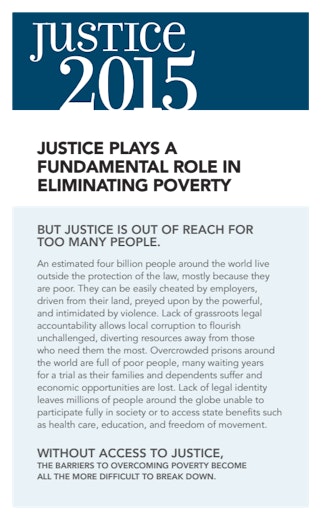Justice 2015: Justice Plays a Fundamental Role in Eliminating Poverty
Justice plays a fundamental role in eliminating poverty. But justice is out of reach for too many people.
An estimated four billion people around the world live outside the protection of the law, mostly because they are poor. They can be easily cheated by employers, driven from their land, preyed upon by the powerful, and intimidated by violence. Lack of grassroots legal accountability allows local corruption to flourish unchallenged, diverting resources away from those who need them the most. Overcrowded prisons around the world are full of poor people, many waiting years for a trial as their families and dependents suffer and economic opportunities are lost. Lack of legal identity leaves millions of people around the globe unable to participate fully in society or to access state benefits such as health care, education, and freedom of movement.
Without access to justice, the barriers to overcoming poverty become all the more difficult to break down.
Evidence shows that access to justice boosts development.
- In the Philippines, the Asian Development Bank studied the impact of training community members as paralegals to support agrarian reform. Farmers in communities with paralegals saw higher levels of productivity, higher farm incomes, and more investment in their farms.
- In Indonesia, a local NGO used female paralegals to expand understanding about rights and entitlements in female-headed households. Alongside international partners, the NGO supported government reforms of state and religious justice institutions by raising awareness and assisting with women's cases, contributing to a fourfold increase in the number of women able to access circuit courts the following year.
- In Ecuador, the World Bank evaluated five legal service centers focused on enforcing child support payments for poor women and reducing domestic violence. The study found that the centers’ clients seeking child support were 20% more likely to succeed than those without access to legal aid. They were also 17% less likely to experience physical violence after separation from their partners.
- In India, filing claims under the Right to Information Act (RTIA) has helped New Delhi’s slum dwellers to obtain ration cards for subsidized foodstuffs. A Yale University study found that 94% of ration card applicants who filed RTIA inquiries into the status of their application received their cards within a year. Only 21% of those who did not file a claim received their cards.
- In Sierra Leone, extended or unlawful pretrial detention damages the prosperity and health of prisoners and their families. An Oxford University study showed that a program placing paralegals in prisons to provide free legal services has reduced the numbers of prisoners held on remand by 20% and increased the percentage gaining access to bail by 13%.
There are many, many more examples of justice boosting development and reducing poverty. Go to www.namati.org to find out more.
A Measurable Development Target
How do you measure access to justice? There are basic metrics and targets already in use. Governments, civil society, and academics agree that justice can be measured in a new development framework. Let’s measure the number of persons who can access reliable, affordable legal information should they need it. Or reduce to zero the number of individuals who lack a basic legal identity document. Or increase the land mass for which communities have secure ownership rights. Or measure the proportion of women who have confidence in formal law courts or traditional systems for resolving legal disputes.
Topics
- Climate Justice
- Digital Rights and Fair Elections
- Discrimination and Racial Justice
- International Crimes
